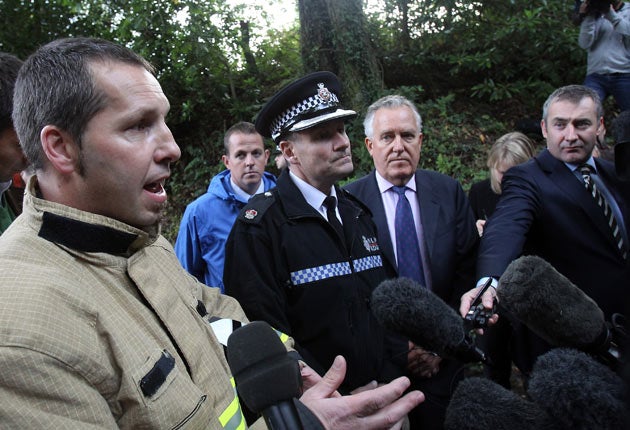This is the end we all feared, but hoped against hope would not happen, says MP

The body of a fourth miner was discovered in Gleision Colliery last night, dealing a final blow to the hopes of the small Welsh community, who had clung tenaciously to the belief that at least one of the four trapped inside would be pulled alive from the flooded mine.
"We've tried to bring this safely to its conclusion. Unfortunately the conclusion we have is the one none of us wanted," said Peter Vaughan, the Chief Constable of South Wales.
Police confirmed that Phillip Hill, Charles Breslin, David Powell and Garry Jenkins had all perished in the worst British mining accident in three decades. "I can't begin to imagine what the families are going through," Mr Vaughan said. "We've been humbled by the community spirit that's been shown during this most tragic of incidents."
As David Cameron offered his condolences on a "desperately, desperately sad situation", Neath MP Peter Hain said: "This is the end we all feared but hoped against hope wouldn't happen. Extraordinary courage was shown by the families right through the night – tortuous hours of waiting. We can't imagine what they have been through. This has been a stab right through the heart of these local communities. There's a long tradition of mining here but nobody expected the tragedies of past generations would come today."
At the Rhos village community centre, the bad news had come in waves through the day. Amid scenes described as "harrowing and appalling", friends and relatives wept openly as others stood about silently, impotently wondering what to do.
The disaster began on Thursday morning when the miners were blasting underground at the mine, near Pontardawe, seven miles from Swansea. A wall holding back water collapsed, flooding the shaft. The seven miners scrambled for safety and three made it out, one was critically injured.
Throughout the day, it had been hoped that the four trapped men, all from the Swansea Valley, had found refuge in an air pocket as rescue teams worked to clear water from the mine, excavate blockages and shore up the tunnels while pumping in oxygen. But the body of the first miner was discovered before rescuers even made it to the blast site, suggesting he had been trying to reach the exit. When rescuers finally got past the rubble they came across the body of the second miner, buried in silt, then the third and, a few hours later, the fourth.
Welsh mining tragedy
Gleision Colliery is a relic of a past era given a lifeline by the rising price of coal. It is a drift mine, meaning miners can walk straight in rather than having to be lowered down a shaft. In drift mines, the seam can dip and rise but is generally horizontal or slightly downwards.
In 1992, there were 85 drift mines in South Wales but by 2004 only three remained, and last year the Nant Hir Colliery closed, leaving only Gleision and Blaentillery. But rising coal prices, have encouraged a new generation of investors and there are now three shaft mines being developed in South Wales.
Gleision has been operational, since the early 1960s. It is privately owned, and employs about nine miners. It has two tunnels, but most of the shafts are less than three-feet high. Anthracite coal, one of the most valuable and cleanest forms, was being dug. It has a high energy calorific value and is comparatively smokeless, making it ideal for homes.
The worst recent UK mining accident was in 1979 at Golborne in Wigan, when an explosion killed 10.
Lewis Smith
Join our commenting forum
Join thought-provoking conversations, follow other Independent readers and see their replies
Comments
Bookmark popover
Removed from bookmarks